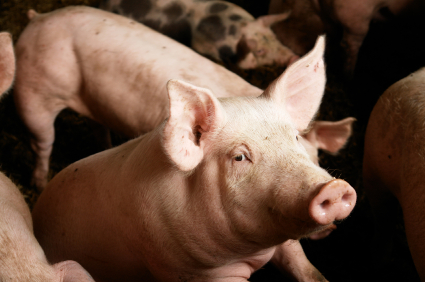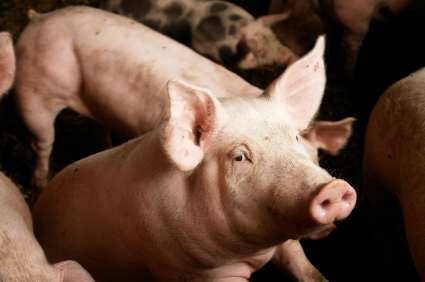 Hogs in a CAFO.
Hogs in a CAFO.
The good news is that bloggers and other hysterics aren’t the only ones taking seriously La Gloria, Mexico, as the possible origin of the swine flu pandemic.
From an extremely interesting AP article:
Scientists are returning next week to La Gloria, a pig-farming village in the Veracruz mountains where Mexico’s earliest confirmed case of swine flu was identified. They hope to learn where the epidemic began by taking fresh blood samples from villagers and pigs, and looking for antibodies that could suggest exposure to previous swine flu infections.
The bad news is that the scientists aren’t from the World Health Organization or some other neutral international group. Indeed, one of the two scientific teams that have arrived in La Gloria is funded by the biotech industry–and rather than investigate the large-scale concentrated-animal feedlot operations that lie at the villages perimeter, they’re focusing on backyard hog raising as the culprit. Here is AP:
Dr. Carlos Arias … is leading a group of flu detectives from the Biotechnology Institute and the veterinary school of the National Autonomous University of Mexico back to the village at the invitation of the Veracruz state government.
….
Arias said his team also will examine environmental and sanitary conditions in homes where pigs are raised, and make recommendations to the Veracruz government aimed at reducing the potential for human infections.
The Biotechnology Institute “is dedicated to educating teachers, students and the public about the promise and challenges of biotechnology,” according to its Web site–which, according to a statement at the bottom of the homepage, is “funded through a grant from Merck Company Foundation.” The institute’s board consists of a combination of pharma execs (from Pfizer, Amgen, Wyeth, etc.) and biotech trade groups (e.g., the Biotechnology Industry Organization).
Both major sectors of the biotech industry have a stake in the ongoing viability of industrial-scale meat production. Ag-biotech companies like Monsanto sell the great bulk of corn and soy seeds that supplies feed for CAFOs; and the bio-pharma companies generate the the flu vaccines and antivirals needed to keep CAFOs humming. Thus the biotech industry has a vested interest in hanging the flu pandemic of 2009 on a small family farm.
On a slightly more hopeful note, a Mexican government team also plans to alight on La Gloria for more testing. AP:
A federal government research team also plans to return to La Gloria, to review health records, interview residents and search for antibodies. The boy’s positive test result “has to lead us to go back and look closer,” said Dr. Ethel Palacios, deputy director of Mexico’s swine flu monitoring effort.
Labs capable of testing for the new swine flu strain have focused on helping sick people rather than finding scientific evidence pointing to the origins of the epidemic, which has now sickened more than 10,000 people around the world and killed 80, mostly in Mexico.
Okay, but where is the WHO–and where in the comprehensive investigation of the massive hog-rearing operations that lie on the perimeter of La Gloria, run by U.S. pork giant Smithfield? Smithfield recently announced that its hogs recently tested negative for swine flu; but recall that Smithfield itself selected samples from 30 pigs for the test.
WHO officials, who do not appear to be on the ground in La Gloria, are mystified by the information coming out of the area, AP reports. WHO flu specialists recently participated in a Science paper that took La Gloria’s status as ground zero as an assumption.
They’re not buying the official story that only one resident of La Gloria, a five-year-old boy, actually got infected with swine flu. The other 1800 people in the village of 3000 who got violently ill, we’re supposed to believe, had caught normal seasonal flu. According to AP, Christophe Fraser, a UK-based flu specialist who co-authored the study, finds “Mexico’s assertion that seasonal influenza was solely to blame [for the La Goria outbreak] unlikely.”
And even Carlos Arias, the scientist from the Biotech Institute, is raising qustions about lack of transparency around test results. AP:
Meanwhile, Arias is frustrated that the government has not provided details about its tests on humans and pigs.
“The information is not been distributed freely,” he said. “We cannot work with only assumptions and rumors. We need solid data.”




